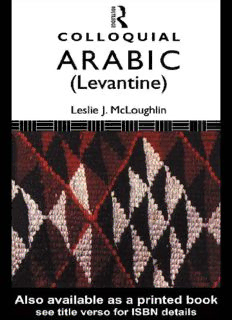
colloquial arabic (levantine) PDF
Preview colloquial arabic (levantine)
COLLOQUIAL ARABIC (LEVANTINE) The Colloquial Series Series adviser: Gary King The following languages are available in the Colloquial series: Albanian Korean Amharic Latvian Arabic (Levantine) Lithuanian Arabic of Egypt Malay Arabic of the Gulf Mongolian and Saudi Arabia Norwegian Basque Panjabi Bulgarian Persian *Cambodian Polish *Cantonese Portuguese *Chinese Portuguese of Brazil Croatian and Serbian Romanian Czech *Russian Danish Slovak Dutch Slovene Estonian Somali Finnish *Spanish French Spanish of Latin America German Swedish Greek *Thai Gujarati Turkish Hindi Ukrainian Hungarian *Vietnamese Indonesian Welsh Italian Japanese Accompanying cassette(s) (*and CDs) are available for all the above titles. They can be ordered through your bookseller, or send payment with order to Routledge Ltd, ITPS, Cheriton House, North Way, Andover, Hants SP10 5BE, or to Routledge Inc., 29 West 35th Street, New York NY 10001, USA. COLLOQUIAL CD-ROMs Multimedia Language Courses Available in: Chinese, French, Portuguese and Spanish Forthcoming: German COLLOQUIAL ARABIC (LEVANTINE) Leslie J.McLoughlin Routledge London and New York First published in 1982 by Routledge & Kegan Paul Plc Routledge is an imprint of the Taylor & Francis Group This edition published in the Taylor & Francis e-Library, 2003. © Leslie J.McLoughlin 1982 All rights reserved. No part of this book may be reprinted or reproduced or utilized in any form or by any electronic, mechanical, or other means, now known or hereafter invented, including photocopying and recording, or in any information storage or retrieval system, without permission in writing from the publishers. British Library Cataloguing in Publication Data McLoughlin, Leslie J. Colloquial Arabic (Levantine). 1. Arabic language—Spoken Arabic 2. Arabic language—Grammar I. Title 492´.783421 PJ6307 80–42071 ISBN 0-203-13615-2 Master e-book ISBN ISBN 0-203-17570-0 (Adobe eReader Format) ISBN 0-415-05107-X (Print Edition) ISBN 0-415-01854-4 (cassette) ISBN 0-415-00073-4 (book and cassette course) CONTENTS ABBREVIATIONS vii INTRODUCTION 1 PART ONE THE LESSONS 13 1 Nouns and adjectives; basic sentences 13 2 Possession and pronouns 18 Appendix: Numbers 21 3 Verbs, word order and demonstratives 24 4 Verbs, conjunctions and elatives 33 5 Participles 40 6 Hollow verbs and ‘to be able’ 44 7 Verbs, defective and doubled 50 8 Assimilated verbs, conjunctions and ‘for’ 58 9 Relative pronouns, verbal nouns and possession 63 10 More verbs, verbal phrases and whenever/whoever 69 11 Conditional sentences 73 12 Idioms 76 13 Terms of address and reference 86 14 Proverbs 92 15 Courtesy expressions for various occasions 97 16 A story 101 17 A miscellany 105 18 Concepts in society 112 19 Abuse 117 v vi CONTENTS PART TWO APPENDICES Key to exercises 121 Grammar, indexed by lesson 127 Vocabulary 129 Bibliography 145 ABBREVIATIONS adj. Adjective BRP British Received Pronunciation c. Common (of gender) CA Classical Arabic coll. A. Colloquial Arabic f. Feminine lit. Literally m. Masculine n. Noun pl. Plural prep. Preposition pron. Pronoun sing. Singular vb Verb v.n. Verbal noun INTRODUCTION Arabic is the language of daily communication for between 150 and 200 million people, and the language of worship for many hundreds more millions of Muslims. It is the original language of the Koran, which in Muslim belief is incomparably excellent, since it is the direct word of God (kalaam allaah). Arabic is the language of prayer for all Muslims, and the language of the muezzin who summons the faithful to prayer the world over five times daily. It is now an official working language in the UN and many international agencies. Its script is used in many other languages—Persian, Ottoman Turkish and Urdu among them—and since the Koran is possibly the world’s best selling book the Arabic script may well be the second most used script after Latin. The Arabic written language is almost completely uniform throughout the Arab world. Moreover the language of radio and television is uniform to the same extent, since it is simply the written word of modern Arabic being read aloud. There is a direct line of descent from classical Arabic, the language of the Koran, to modern Arabic; so that across 1,400 years (in the Islamic calendar) the script is recognizably the same, the grammar has changed remarkably little (by comparison with, for example, German or English) and even the vocabulary has shown an astonishing integrity and consistency. It is the Koran which has preserved the essence of written Arabic, and it is also the elevated status accorded to the original language of Islam which has prevented the Arabic dialects from becoming as far apart from each other as the dialects of Latin. Whereas Italian and French are not now mutually comprehensible, the speakers of dialects of Arabic over an enormous area can understand each other. Peasants from Muscat and Morocco 1
Description: